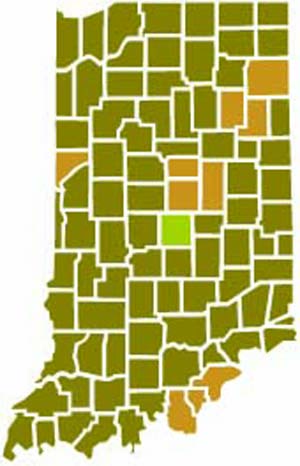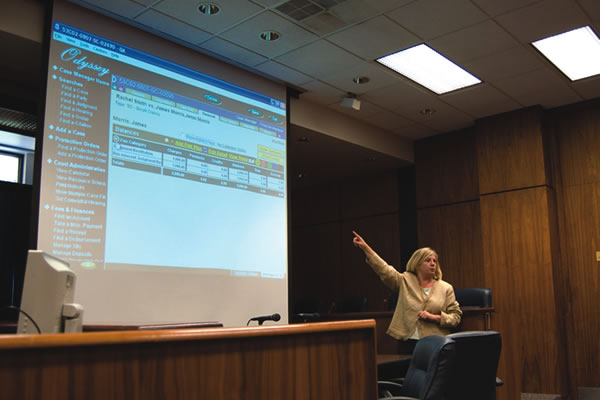
With the successful completion of the first phase of deployment of the state Odyssey case management system (CMS) in the 10 pilot court sites (9 Monroe County trial courts and one Washington Township, Marion County small claims court), work is under way to prepare the next deployment in 10 potential county sites. These 10 counties are home to 35 trial courts, eight small claims courts, and 14 city and town courts.
The Indiana Supreme Court selected Odyssey as the state CMS and is in the process of offering it to the courts and clerks, at no cost to the counties, with the goal being that Odyssey will eventually link all courts in the state with each other, with other state agencies, and with others who need and use court information. Already, through a public web site, the Indiana Supreme Court provides the Odyssey case information to the public at no cost. Odyssey is also being interfaced with the state e-citations project to provide a seamless, electronic, end-to-end process for the issuance, filing and transmission to the Bureau of Motor Vehicles, of traffic citations. Phase II, the current phase of this monumental project, moves Indiana one step closer to the ultimate goal of interconnected courts and state agencies for an efficient and effective judicial administration system.
“We are very excited to have 10 more sites preparing to use Odyssey. Our staff is working hard to prepare for the next set of courts to receive Odyssey. Teams are in the process of visiting the court and clerk offices in those counties to identify unique local needs and procedures,” said Mary L. DePrez, Director and Counsel for Trial Court Technology with the Division of State Court Administration.
With the hard work and commitment of the Monroe County judges, their staffs, the clerk of court, Jim Fielder, and his staff, the first deployment team learned many lessons that will improve the Phase II deployment. The successful deployment of a case management system is a complex process that entails extensive planning and training. Some of the steps in that process are:
Planning
The planning process includes meeting with leadership from each court and clerk’s office to gather and document preliminary information such as number of employees that will use the system, existing systems and processes, local rules and practices, equipment and network needs, financial information, etc.
Data Conversion
Data conversion means taking data from an existing case management system and converting it to a format that is usable by the Odyssey CMS. The first step in data conversion is gathering specific relevant information from each county.
Configuration
Once local information is collected about the users, what access each should have, local practices and rules, Odyssey is then configured to meet each county’s specific needs. For example, requirements of local rules may necessitate that Odyssey be configured to reflect those local variables. Configuration typically takes place during the month before each county’s launch date.
On-Site Presence
Once a Go-Live date is set, deployment staff will hold numerous meetings with court and clerk leadership, present on-site Odyssey demonstrations and provide opportunities for local staff to ask questions. A newsletter and emails provide continuous communication with the local leadership and staff.

Training
A major part of the deployment process is hands-on training for all court and clerk employees who will use Odyssey. Training will typically begin approximately 3-4 weeks prior to Go-Live date and will continue after the deployment.
As the deployment teams help local courts and clerks prepare for Odyssey, certain operational steps must occur to ensure a smooth transition. One such step is that the County Clerk Financial Accounts must be balanced before Odyssey can Go-Live.
“We know the collaborative process works best, and the more input we get from local staff the smoother the deployment will be,” said DePrez. “The pilot deployments taught us the value of training users by roles and responsibilities and that review of procedures by local content experts is critical.”
More specific information on costs and funding sources, are available online at courts.in.gov/jtac.